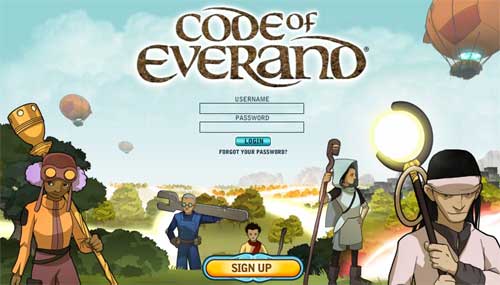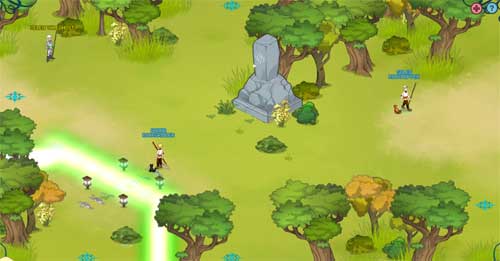
The Department for Transport launched an online multiplayer fantasy roleplaying game last week, with the apparent aim of teaching kids to look left and right before crossing the road. Or at least, having played Code of Everand for a little while today, that’s about the only road safety message I’ve been able to find in it.
Basically, it’s a familiar tale of wandering around, building up experience points and currency. Except that to get around the world, you need to cross over the ‘spirit channels’ – requiring you to look left and right, and deploy magical weaponry to defeat the scary monsters which zoom past you. Once you’ve zapped the monsters, you can only cross the road channel when you’ve looked left and right again.

The press release quotes evidence that ‘computer games can help children develop essential skills such as logical thinking, planning ahead and cooperation’. And according to road safety minister Paul Clark, ‘by communicating with children through a medium they already enjoy using we hope to improve their understanding of the importance of safe road behaviour.’
Now I accept, I’m not the target audience here. I don’t enjoy these kinds of games; and since the campaign seems to be aimed at 10-12 year olds, I’m a bit outside the target age range. So whilst it seems a bit tedious and mechanical to me, I’m sure there’s more to it if you’re into that sort of thing.
However… Edge Online reveals a few extra details which the press release doesn’t:
Code Of Everand is the result of over two years of work with the Department For Transport by [US-based] Area/Code principals and designers Frank Lantz and Kevin Slavin, not only because of its size and ambition, but also because of the complexities of developing it for a government body. The project, after all, has gone through several incarnations and has been on the brink of cancellation twice.
And Simon Williams of DfT’s media agency Carat admits:
Kevin and myself are pretty much the only constants on this project – I don’t think any of the original clients are left. It’s been difficult – and nearly cancelled twice – because of logistics, budgets and stuff. … I guess we don’t really know what to expect, and I suppose we’re not really sure how to measure it, so we’ve been doing a merry tour around the academic institutions in the country to find a consortium to evaluate it.
Inevitably, you’re left wondering how much it has all cost, and how they’re going to measure its success. Williams says ‘certainly less than they would spend on a normal decent sized TV campaign’, but there’s no figure quoted.
I imagine an opposition PQ is already in draft.